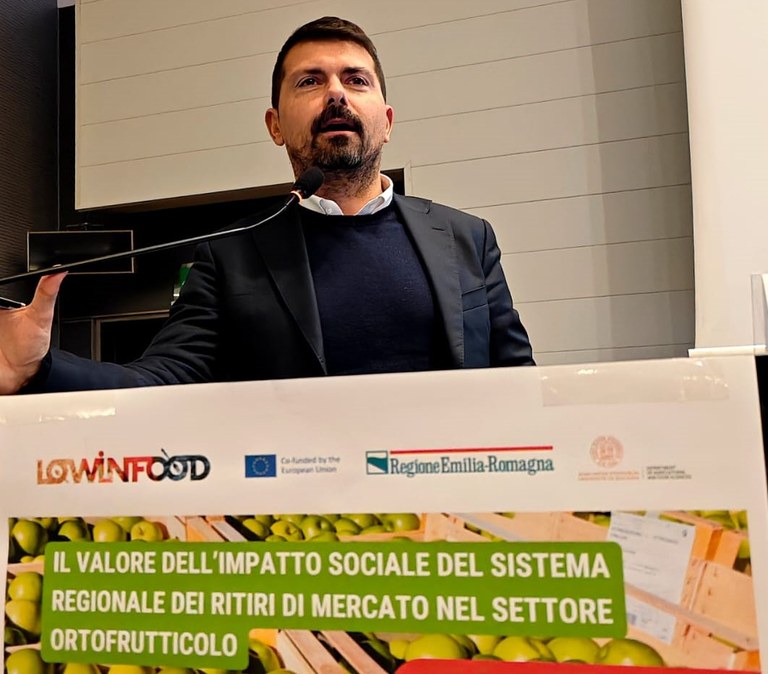The social impact of the market withdrawals regional system through S.I.R. platform
A few days before the conclusion of Lowinfood project, Emilia-Romagna Region hosted the event "The value of the social impact of the regional system of market withdrawals in the fruit and vegetable sector" on February 17 2025 in Bologna. The European project, funded by Horizon 2020 programme, aims to measure the economic, environmental and social impact of seven innovations related to food waste reduction in 4 supply chains, including fruit and vegetables.
Emilia-Romagna Region is part of Lowinfood consortium and replicated in Romania its innovation, together with University of Bologna. The S.I.R. platform (Sistema Informativo dei Ritiri) has allowed since 2012 to efficiently manage the procedure of fruit and vegetables withdrawing from the market and distributed by charities to the poor.
First part – Keanote presentations
After V. Mazzotti’s welcome speech, the project coordinator C. Cicatiello (Unituscia) recalled the steps of Lowinfood, including both good results and the challenges faced by the partners. G. De Martino showed how the withdrawals of fresh product surplus works with the EU reimbursements and the figures of this system: in 12 years more than 163,000 tons of fresh fruit and vegetables were distributed for free.
F. Tonegatti from Unibo presented the recent research work on the quantification of social impact of the S.I.R. platform: through a participatory method involving all the actors, the social impact was calculated in terms of Social Return On Investment - SROI. The work highlighted the role of public bodies for the coordination of food recovery and support to the Third Sector, reaching people at risk of food poverty and often in condition of social distress.
The last three presentations showed how Emilia-Romagna is using different strategies to tackle food waste. P. Bissi explained how the Region is supporting agri-food centres for the solidarity supply chain project: thanks to their skills and facilities, it was possible to further increase the volumes of fresh products distributed to the poor and to decrease transport costs.
A. Lauriola focused on the health aspects of recovering food surpluses with the guidelines for operators and charities about food safety.
Finally, M. Bottazzi presented the regional calls about recovery and redistribution of surpluses for food banks, canteens and other regional projects.
Second part – Round Table
 During the round table, the moderator S. Vitali interviewed the main actors of the process.
During the round table, the moderator S. Vitali interviewed the main actors of the process.
In the opening speech S. Bonaccini, eurodeputy and member of the EU Committee on Agriculture, hightlighted the value of food and praised the role of producer organisations, which are a regional excellence. The contribution of projects such as Lowinfood will give a boost to the Commission's work in the next years.
L. Martini and M. Tamanti, directors of regional APOs, explained how the withdrawals can either support producers’ income and have a useful destination: a key factor of the success is the spirit of cooperation they hope to find more resources in the operational programmes for this purpose.
 G. Magagnoli, director of CAL Parma, shared the improvement plan for the solidarity supply chain project, to reach even the smallest towns; Professor L. Falasconi from Unibo, who directed the research work, and M. Prosperini for Caritas Bologna, underlined the personal relationship created through food and the role of the volunteers. A reflection on this central figure and on the sustainability of the system will soon be necessary, taking into account the elderly age of most of them.
G. Magagnoli, director of CAL Parma, shared the improvement plan for the solidarity supply chain project, to reach even the smallest towns; Professor L. Falasconi from Unibo, who directed the research work, and M. Prosperini for Caritas Bologna, underlined the personal relationship created through food and the role of the volunteers. A reflection on this central figure and on the sustainability of the system will soon be necessary, taking into account the elderly age of most of them.
In the closing speech, Councilor A. Mammi observed that Lowinfood project reflects the values of our region and the attention always paid to the product quality and the economic, environmental and social sustainability of the processes.
The growing request for food aid should be supported with the distribution of fruit and vegetable surpluses, but also with adequate support measures taken by the Region.
Download the presentations (in Italian):
- Clara Cicatiello – Le innovazioni per prevenire gli sprechi e il progetto LOWINFOOD (
1.05 MB)
- Gianmario De Martino – La piattaforma S.I.R. e il sistema dei ritiri (
2.57 MB)
- Federico Tonegatti – L’impatto sociale del sistema dei ritiri (
1.08 MB)
- Paola Bissi – Il sostegno al progetto di logistica solidale della Rete dei Mercati regionali (
197.17 KB)
- Antonio Lauriola – Le azioni della RER per diminuire lo spreco alimentare (
1.13 MB)
- Michela Bottazzi – Il sostegno della RER al terzo settore per il recupero di beni alimentari (
655.88 KB)
Watch the recorded event


